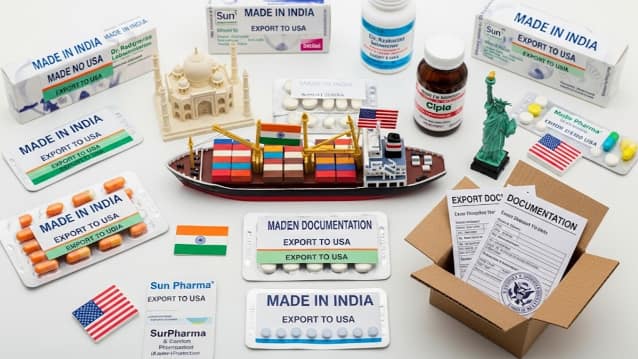Although pharmaceuticals have not been included in the latest tariff round, significant duties on pharmaceutical products could pose “downside risks”.

The US is a core export market for most large Indian drugmakers. (Source: AI Image)
While most Indian corporations currently face limited direct impact from the tariffs imposed by the United States, certain export‐oriented sectors such as pharmaceuticals could face increasing pressure if trade restrictions widen or remain in place for a prolonged period, warned Fitch Ratings.
The United States recently imposed a 25 per cent “reciprocal” tariff on a range of Indian products, effective from August 7, 2025, alongside a separate 25 per cent levy linked to imports of Russian crude oil scheduled to take effect from August 27.
Fitch, in its new Fitch Wire report, noted that while the immediate fallout of these measures is limited, the second-order effects could begin to weigh on the operating performance of select corporates.
Also read: MSMEs in Export Hurt More by our Self-Inflicted Wounds: GTRI’s Ajay Srivastava
The most exposed sector, according to the rating agency, is pharmaceuticals. The US is a core export market for most large Indian drugmakers, and several companies supply their products to the US from manufacturing facilities in India. Biocon Biologics, for example, derives around 40% of its revenues from the US market.
Although pharmaceuticals have not been included in the latest tariff round, significant duties on pharmaceutical products could pose “downside risks”.
Likewise, chemicals present a similar risk. According to the report, crop protection chemical producer UPL Ltd earns roughly 10–12 per cent of its total revenues from the US and hence, tariffs on the company’s India-made products could bring duties closer to those imposed on Chinese competitors, eroding the company’s price advantage.
For Indian IT services, construction, cement, telecoms and utilities, the direct tariff impact is likely to be minimal. Nevertheless, Fitch warned that a sustained level of US tariffs significantly above those of other Asian markets would weigh on the operating performance of more Indian companies.
“If US tariffs are sustained at levels significantly higher than in other Asian markets, we see moderate downside risks to our projection that the economy will grow by 6.5% in FY26,” Fitch said.
Empower your business. Get practical tips, market insights, and growth strategies delivered to your inbox
By continuing you agree to our Privacy Policy & Terms & Conditions
